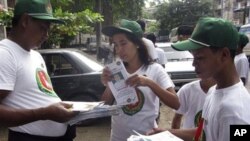Burma's military-backed political party is pledging to practice multi-party democracy and market-oriented economics.
The chief of the military-supported Union Solidarity and Development Party, Htay Oo, appeared in a 15-minute broadcast on state-run radio and television late Friday in advance of the November 7 elections. He said his party would guarantee Burmese citizens freedom of religion and would engage in "independent and active foreign policies."
The elections are Burma's first since 1990. The now-banned National League for Democracy won a landslide victory then but was prohibited by the country's military rulers from taking power.
Critics say the elections next month are a charade to put a civilian face on continued military rule.
Oo did not mention Aung San Suu Kyi, the head of the pro-democracy party whom the military has detained for 15 of the last 21 years. He said the Union Solidarity party deems "officially registered political parties and individuals as colleagues."
Oo's statement also was printed Saturday in the state-run New Light of Myanmar newspaper. The statement said his party will guarantee people's "rights and liabilities... in line with the constitution."
The pro-democracy party has urged its supporters to boycott the election. The government disbanded the party in May after it failed to register for the November election.
Altogether, 37 political parties, including the Union Solidarity party, are participating in the election for 1,157 seats, including 494 in Burma's Union Parliament and the remainder in regional parliaments. A quarter of the seats in the national parliament have been reserved for the military.
Nobel laureate Aung San Suu Kyi is under house arrest, with her latest term set to expire six days after the election. Burma's Supreme Court has agreed to hear a new appeal of her detention on October 18.
Some information for this report was provided by AP and AFP.




